| Srl | Item |
| 1 |
ID:
071315
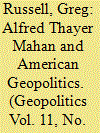

|
|
|
|
|
| Publication |
2006.
|
| Summary/Abstract |
Debate about the goals of American foreign policy at the end of the twentieth century, especially that thread differentiating "conservative" from "neoconservative" perspectives, might profit by revisiting the debate over American expansion at the end of the nineteenth century. "I am an imperialist," Captain Alfred Thayer Mahan once remarked, "simply because I am not isolationist." This paper explores the connection between Mahan's defense of imperialism-often couched in terms of national interest and balance of power- and the norms of American power in world politics. The will-to-power behind American expansion and involvement, a formidable pillar in Mahan's realism, coexisted (often uneasily) with the affirmation of national purpose, a less formidable but still important part of Mahan's idealism. Mahan's strong conservative inclinations in politics were matched by a willingness to employ the tools of realism-particularly traditional diplomatic methods-as a way to uphold historic national goals and moral vision in American foreign policy. Far from seeing an irremediable conflict between the counsels of realism and limited moral gains in foreign policy, Mahan understood that governments are not immune from certain overall constraints. Seldom if ever could American actions abroad be defended by arguing solely for the maintenance or increase of national power.
|
|
|
|
|
|
|
|
|
|
|
|
|
|
|
|
| 2 |
ID:
071312
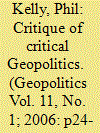

|
|
|
| 3 |
ID:
071313
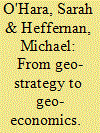

|
|
|
|
|
| Publication |
2006.
|
| Summary/Abstract |
In this paper we examine the changing perception of Central Asia and the Caucasus to Imperial Britain from the mid nineteenth to the mid twentieth centuries and consider the importance of Mackinder's 1904 paper 'The Geographical Pivot of History' to this process. In it we argue that Central Asia and the Caucasus are seen first as an important buffer zone essential to keeping the Russia aggressors at bay and ensuring Britain's continued dominance of India. By the end of the nineteenth century, however, the region had emerged as a major source of raw materials, particularly oil, and as such was no longer seen as merely a buffer zone, but a considerable prize in itself. Mackinder's paper, which emerged at a critical point in this transition, served as an important synthesis of these long-standing and widely shared British concerns about the region and provided a clear and concise assessment of the region's geo-strategic and geo-economic importance and as such its global significance.
|
|
|
|
|
|
|
|
|
|
|
|
|
|
|
|
| 4 |
ID:
071317


|
|
|
| 5 |
ID:
071316
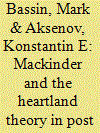

|
|
|
|
|
| Publication |
2006.
|
| Summary/Abstract |
This paper considers the ways in which Halford Mackinder's ideas are represented and mobilized in geopolitical discourses in post-Soviet Russia. Mackinder is broadly recognized as the most important proponent of 'classical' geopolitics, and his teachings about the Pivot of History and Heartland are referred to in virtually all geopolitical texts. Not all of this attention however is positive. We examine the very different ways in which Mackinder is deployed in this literature, and how he is re-signified to make his ideas relevant for contemporary Russia
|
|
|
|
|
|
|
|
|
|
|
|
|
|
|
|
| 6 |
ID:
071314
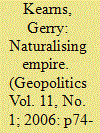

|
|
|
|
|
| Publication |
2006.
|
| Summary/Abstract |
At the start of the twentieth century, Halford Mackinder's geopolitical writings provided a powerful justification for British imperialism. He presented imperialism as a force of nature by emphasising historical rupture, essential conflict and geopolitical strategy. A century later, these same themes re-appear in contemporary accounts of our new world order and serve now to naturalise the imperial mission of the United States. A critical examination of the theses of Mackinder can aid in challenging the presumptions of the new imperialists.
|
|
|
|
|
|
|
|
|
|
|
|
|
|
|
|
| 7 |
ID:
071311
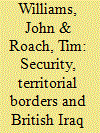

|
|
|
|
|
| Publication |
2006.
|
| Summary/Abstract |
This paper looks at the development of British government policy towards Iraq in the run up to and during the war of 2003 with particular focus on the territorial borders of Iraq. The paper argues that, in contrast to what we might expect from the perspective of classical geopolitics, the issue of the location of Iraq's borders was largely taken for granted by the UK government. The territorial integrity of Iraq was repeatedly asserted by British ministers, including the Prime Minister, Tony Blair. However, the paper suggests that this disguises an important and potentially significant challenge to the role that territorial borders played in the Iraq crisis and conflict, and this is connected to wider changes in thinking about territorial borders in international politics that have characterised the Labour government's foreign policy thinking. This challenge sees territorial borders' significance more in terms of the nature of the regime they help to delimit than the geopolitical significance of their location. Also, the respect to be given to those borders is significantly influenced by the willingness and ability of that regime to contribute to dominant political and politico-economic agendas, including democracy, human rights, counter-terrorism and economic liberalisation. It is argued that policy towards Iraq demonstrates effectively this distinctive approach developed by the UK government, and points to weaknesses as well as strengths of adopting such a position on one of the most important institutions of the international system.
|
|
|
|
|
|
|
|
|
|
|
|
|
|
|
|